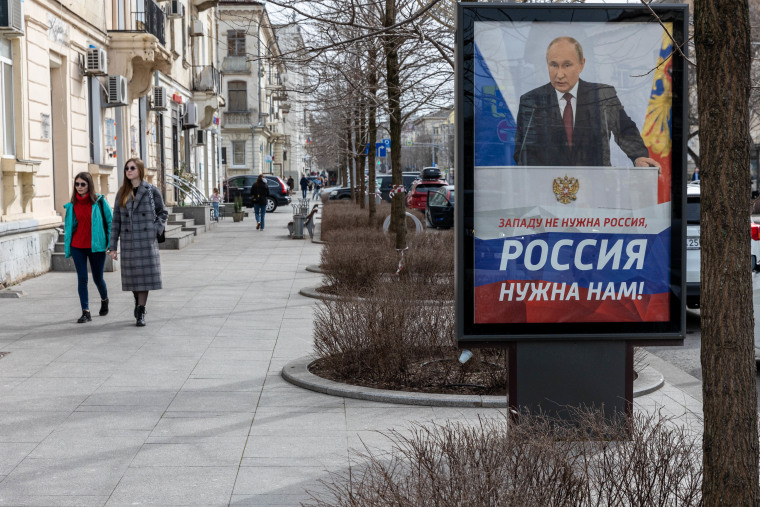[ad_1]
SEVASTOPOL, Crimea — Soldiers kiss loved ones goodbye at train stations. Fighter jets circle overhead. Military vehicles bearing nationalist Z’s on their grills power down the Tavrida Highway, a 155-mile road linking this peninsula’s main cities.
Crimea is a territory teeming with Russian forces.
Nowhere is that truer than in Sevastopol, a city that has long embodied naval might in the Russian imagination.
Fishermen watch as Russia’s Black Sea Fleet docks and sails. “Special Military Operation for the future of Russia,” declares a billboard en route to the port. Sevastopol’s “Victory” cinema now also sports a massive Z. Roads like Lenin Street are lined with red, white and blue Russian Federation flags.
This is not Russia, according to Kyiv, its Western allies and the United Nations. It was annexed by the Kremlin in 2014, with the U.N. calling on Russia to return to its “internationally recognized borders.” And following Moscow’s broader invasion launched a year ago, President Volodymyr Zelenskyy has vowed Ukraine will take Crimea back.
But Praskovya Baranova, 73, speaks Russian, feels Russian and lives here.

“This is our land,” she told NBC News on Monday. “We will all put on uniforms and will go to the border to defend ourselves.”Her comments echoed those of most people NBC News spoke to in Crimea this week. While the government of President Vladimir Putin has cracked down on free speech everywhere, including in Crimea, the peninsula’s majority Russian-speaking population was considered more pro-Moscow than other parts of Ukraine when it was annexed.
Russia says life has improved.
Modern-looking gas stations along the highway sell Coca Cola imported from Belarus, a beverage hard to find in Moscow these days.
But Zelenskyy has said Crimea is one of the reasons he wants more powerful NATO weapons. “Crimea is our land, our territory,” he said in January. “Give us your weapons—we will return what is ours.” And if Ukraine does try to take the peninsula back by force as its leaders have promised, many of the 2.4 million people living here will be caught in the middle.
“He wouldn’t take it,” Ruslan Nalgiev, 36, said. “Even if there is a war here, we would still defend Sevastopol. Because if we don’t defend our motherland we would become slaves. No one wants to become a slave.”
Sevastopol — home to Russia’s Black Sea Fleet in Soviet times and the era of the Russian empire — might be the king on Putin’s chess board: The Russian leader may be determined to protect it at any cost, but Kyiv may now fear any peace deal that left Russia’s navy in the port would threaten its coastline for years to come.
After explosions rocked strategic sites in Crimea and Kyiv’s forces seized back the nearby southern hub Kherson late last year, the door appeared to be open to a campaign to retake the prized peninsula. But Russian forces have regrouped and dug in.
NBC News traveled to Crimea by train from Moscow, across the Kerch Bridge that was blown up in a strategic and symbolic blow to Putin last fall. It is now fully restored but would likely be targeted again if the fight came to this peninsula.
[ad_2]
Source link
